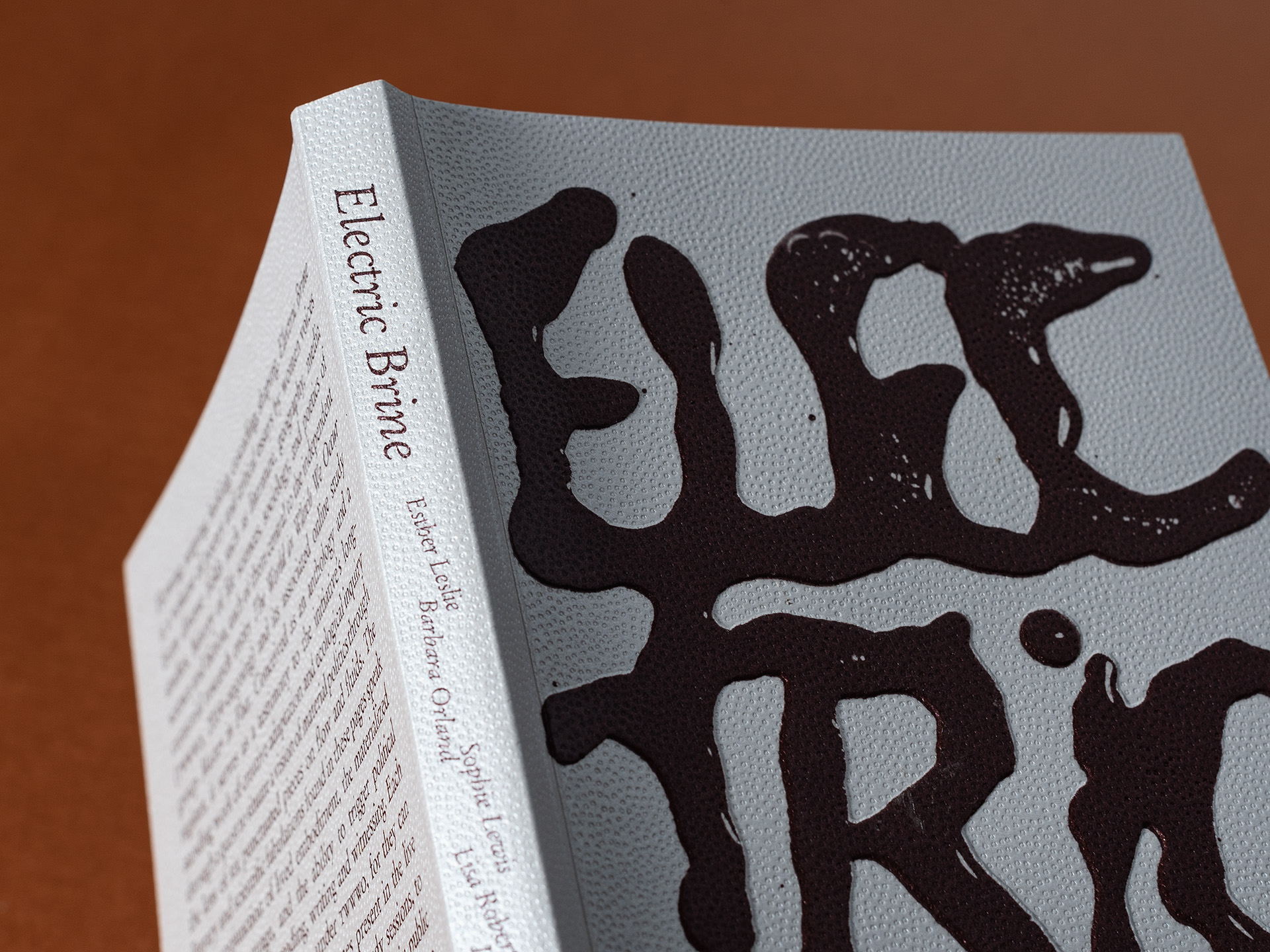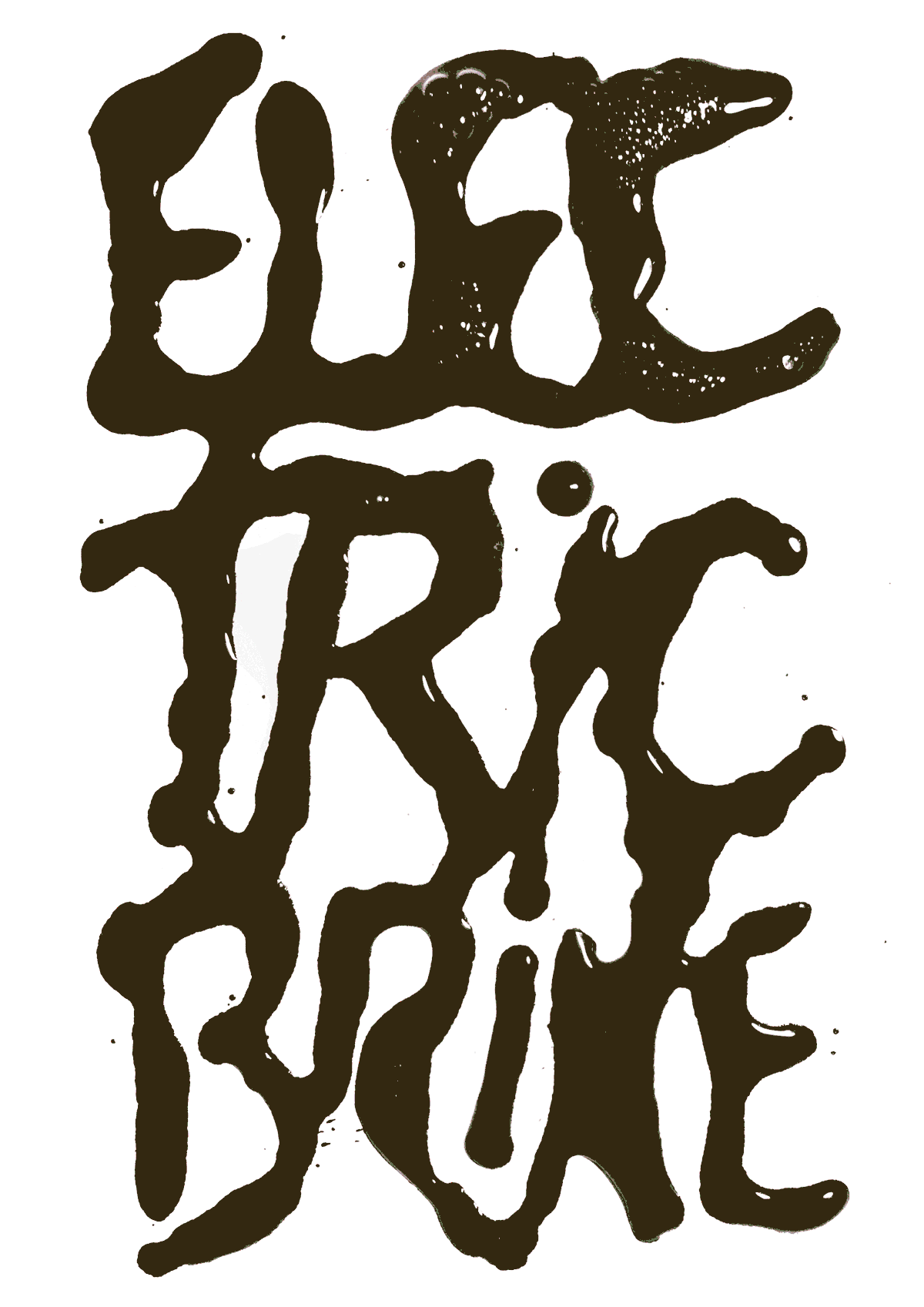Electric Brine – Virtual Book Release
7pm
Please register in advance or follow us live on our Facebook page.
After registering, you will receive a confirmation email containing information about joining the webinar.


Flowing, seeping, leaking, cascading, shaping. Electric Brine is a volume of poetry and critical essays by women voices from diverse fields such as literature, geography, media studies, history of life sciences, sociology, and poetics of science and fiction, each of them central to the independent curatorial research entity The World in Which We Occur (TWWWO, 2014-ongoing) and its associated online study group Matter in Flux. Conceived as an anthology and a register, it serves as a testimony to the initiative’s long-standing work of creative adaptation and ecological inquiry through a quest to situate a vision of material politics through the lens of six punctuated pieces on flow and fluids. The literary and scientific fabulations found in these pages speak of the conjunction of lived embodiment, the materialized quality of language, and the ability to trigger political imagination through reading, writing and witnessing. Each of these strands polyperform under TWWWO, for they can be traced, retroactively, to the themes present in the live event series, to Matter in Flux’s private study sessions, to the initiative’s collective writing work presented in public venues and publications. Also included in this volume is an appendix documenting the years of invitation and study, intricately linked to the ideological praxis of these overlaps.
Read more about the book here.
Esther Leslie is Professor of Political Aesthetics at Birkbeck, University of London. Her books include various studies and translations of Walter Benjamin, as well as Hollywood Flatlands: Animation, Critical Theory and the Avant Garde (Verso, 2002); Synthetic Worlds: Nature, Art and the Chemical Industry (Reaktion, 2005); Derelicts: Thought Worms from the Wreckage (Unkant, 2014), Liquid Crystals: The Science and Art of a Fluid Form (Reaktion, 2016) and Deeper in the Pyramid (with Melanie Jackson, Banner Repeater, 2018). Current research includes a text on the history and present of the device, a study of turbidity and media, a biography of the composer and radio experimenter Ernst Schoen, research for an exhibition at Middlesbrough Institute of Modern Art on the chemical industries of the North East of England and the poetic and political significance of butter in Ireland for the Limerick Biennale.
Sophie Lewis is a communist living in Philadelphia, a member of the Out of the Woods collective, and an essayist on questions of social reproduction theory, queer critique and heterosexual culture. She is the author of Full Surrogacy Now: Feminism Against Family (Verso Books, 2019), and a teacher at the Brooklyn Institute for Social Research. She is also a Visiting Scholar at the Alice Paul Center of the University of Pennsylvania. Books she has helped translate from German to English include Communism for Kids by Bini Adamczak, A Brief History of Feminism by Antje Schrupp, and The Future of Difference by Paula- Irene Villa and Sabine Hark. Her repro-utopian free-lancing can be accessed and supported at patreon.com/reproutopia.
Lisa Robertson is a Canadian poet, essayist and novelist who lives in France. She began publishing in the early 90s in Vancouver, where she participated in a diverse community of poets, visual artists, and academics, who chose to work collectively, organizing talks, workshops, exhibitions, publications and reading groups whose topics moved across the disciplines of contemporary art, literary studies, poetics, cultural studies, and political and social history. Her 12 books include The Weather (2001), a poetic text that critically engages the rhetoric of British meteorology from the seventeenth to early nineteenth centuries, and which has been translated to French and Swedish; Occasional Works and Seven Walks from the Office for Soft Architecture (2003), a collection of essays considering the architectural and urban history of Vancouver in terms of a phenomenology of surfaces; Nilling: Prose Essays on Noise, Pornography, the Codex, Melancholy, Lucretius, Folds, Cities and Related Aporias (2012); and 2020’s The Baudelaire Fractal, a novel considering the urban history of Paris in relationship to nineteenth century French painting, and 1980s girlhood. Her current research involves Émile Benveniste and a linguistics of poetics, and wide rime, an ongoing study of the troubadour culture and poetry of the twelfth and thirteenth Occitan region.
Jennifer Teets (editor of Electric Brine) is an American curator and writer based in Paris working at the intersection of science studies, literature, and performance. She is interested in the “backstory” of matter, its conditioning as both ‘natural’ and ‘cultural’ vis-à-vis materials such as milk and cheese (post trauma goat milk production), terra sigillata (sealed medicinal earth), and mud. Within her work she addresses the roles of consumption and contamination as an embodiment of thought which then performs, spores, proliferates. She has curated numerous exhibitions and talks since the early 2000s with artists and thinkers worldwide and is the director/convener of The World in Which We Occur, a research-based entity that explores themes concerned with artistic inquiry, philosophy of science, and ecology and its associated study group Matter in Flux. Since 2014 she has collaborated with artist/philosopher Lorenzo Cirrincione on Elusive Earths, an ongoing in situ work, process, and inquiry that looks at the elusiveness of rare clays, soils, and earths with forgotten origins. She is editor of Electric Brine (2021) published by Archive Books, Berlin.
Elise Misao Hunchuck (co-editor of Electric Brine) is a Canadian transdisciplinary landscape researcher, editor, and writer based in Berlin. Elise is a visiting professor at the Royal College of Art and a senior researcher and lecturer at The Bartlett School of Architecture, London. She is co-editor of Electric Brine (2021) published by Archive Books, Berlin and an editorial board member for the journal Scapegoat: Architecture/Landscape/Political Economy. Elise is the editorial curator for transmediale 2021–22.
Matter in Flux (MiF) is an educational and knowledge building axis attached to the curatorial research-based entity The World in Which We Occur (TWWWO). MiF is committed to critical analysis, sociological inquiry, debate, and collective writing. Most of our work is done behind the internet’s curtains: many of us are artists, curators, theorists, and health practitioners working at the intersection of various disciplines. Our interrogative line considers politically enmeshed scientific affairs in ecological politics and policy, economies of transition, history of science, material studies, and gender studies in science. When reading and in session, we focus on metabolic transactions, plasmatic fictions, and various degrees of para-scientific approaches.
